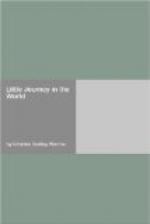“Who is that lovely creature?” asked Margaret, indicating a box opposite.
I did not know. There were two ladies, and behind them I had no difficulty in making out Henderson and—Margaret evidently had not seen him Mr. Lyon. Almost at the same moment Henderson recognized me, and signaled for me to come to his box. As I rose to do so, Mrs. Morgan exclaimed: “Why, there is Mr. Lyon! Do tell him we are here.” I saw Margaret’s color rise, but she did not speak.
I was presented to Mrs. Eschelle and her daughter; in the latter I recognized the beauty who had flashed by us in the Park. The elder lady inclined to stoutness, and her too youthful apparel could not mislead one as to the length of her pilgrimage in this world, nor soften the hard lines of her worldly face-lines acquired, one could see, by a social struggle, and not drawn there by an innate patrician insolence.
“We are glad to see a friend of Mr. Henderson’s,” she said, “and of Mr. Lyon’s also. Mr. Lyon has told us much of your charming country home. Who is that pretty girl in your box, Mr. Fairchild?”
Miss Eschelle had her glass pointed at Margaret as I gave the desired information.
“How innocent!” she murmured. “And she’s quite in the style—isn’t she, Mr. Lyon?” she asked, turning about, her sweet mobile face quite the picture of what she was describing. “We are all innocent in these days.”
“It is a very good style,” I said.
“Isn’t it becoming?” asked the girl, making her dark eyes at once merry and demure.
Mr. Lyon was looking intently at the opposite box, and a slight shade came over his fine face. “Ah, I see!”
“I beg your pardon, Miss Eschelle,” he said, after a second, “I hardly know which to admire most, the beauty, or the wit, or the innocence of the American women.”
“There is nothing so confusing, though, as the country innocence,” the girl said, with the most natural air; “it never knows where to stop.”
“You are too absurd, Carmen,” her mother interposed; “as if the town girl did!”
“Well, mamma, there is authority for saying that there is a time for everything, only one must be in the fashion, you know.”
Mr. Lyon looked a little dubious at this turn of the talk; Mr. Henderson was as evidently amused at the girl’s acting. I said I was glad to see that goodness was in fashion.
“Oh, it often is. You know we were promised a knowledge of good as well as evil. It depends upon the point of view. I fancy, now, that Mr. Henderson tolerates the good—that is the reason we get on so well together; and Mr. Lyon tolerates the evil—that’s the reason he likes New York. I have almost promised him that I will have a mission school.”
The girl looked quite capable of it, or of any other form of devotion. Notwithstanding her persistent banter, she had a most inviting innocence of manner, almost an ingenuousness, that well became her exquisite beauty. And but for a tentative daring in her talk, as if the gentle creature were experimenting as to how far one could safely go, her innocence might have seemed that of ignorance.




